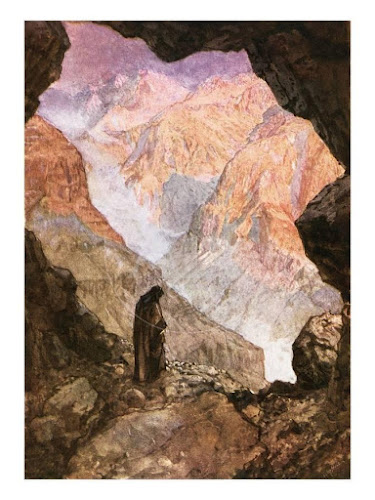 |
| Elijah in the Desert of Horeb, William Brassy Hole, 1846-1917 |
I've always loved this imagery of God speaking through the quiet instead of the loud and obvious. It's the way He mostly speaks to me as well. I look for Him in the others, but He finds me in the everyday meanwhile.
This morning, I'm intrigued with trying to physically place Elijah during the signs, and I do think his location makes a difference in how one interprets the scene. The BBC believes that Elijah is inside the cave for the series of signs. The BKC thinks he's on the mountainside. Did Elijah obey God, go out on the mountain for the miraculous signs but not hear from him then return? or did he cower inside and emerge as a result of the tender whisper?
Sweet commentary here on seeing God in the simple:
"The truest revelation of God to man is a simple one. Whirlwind, earthquake, and fire did not seem to greatly move the prophet. The solitary voice, still and small, with nothing bewildering about it, invited attention to the speaker and the message. It is a mistake which men often make that they look more confidently for revelations of God in large things than in small. For illustrations of the workings of the Divine Providence, they take whole epochs of history. They use a system of numeration in which dynasties and nations are the digits. They trace the slow processes by which some monstrous wrong is at last brought to extinction, or some great truth is finally established in sovereignty, and they say, see how evidently God directs the affairs of the world. To our Lord, a dead sparrow by the roadside meant quite as milch, for He said: “Are not two sparrows sold for a farthing? and not one of them falleth to the ground without your Father.” It is not possible for all men to be profound students; but all men profoundly need that God should stand revealed to them, not after protracted investigation, and once or twice in a lifetime, but every day, and in each new emergency of experience; and just that is possible to them, because, to right seeing men, God is discernible in items as well as aggregates." Monday Club, BI
A distinguished naturalist wrote over his study door: “Be reverent, for God is here.”
There is an Eastern proverb: “God comes to us without bell.” The deepest Divine impressions are those which are made silently upon the heart, not by wind, nor earthquake, nor fire, but by the “still small voice” of His spirit." -Homiletic Review, BI

No comments:
Post a Comment